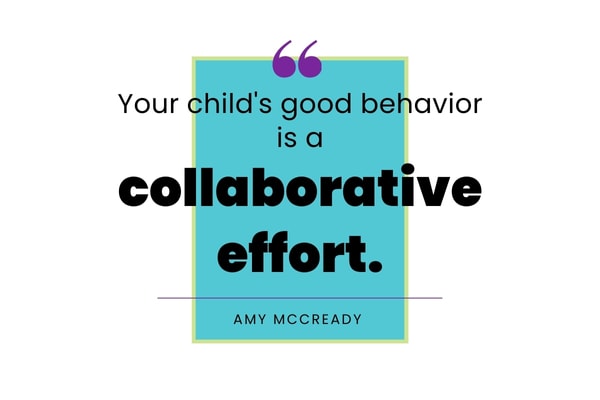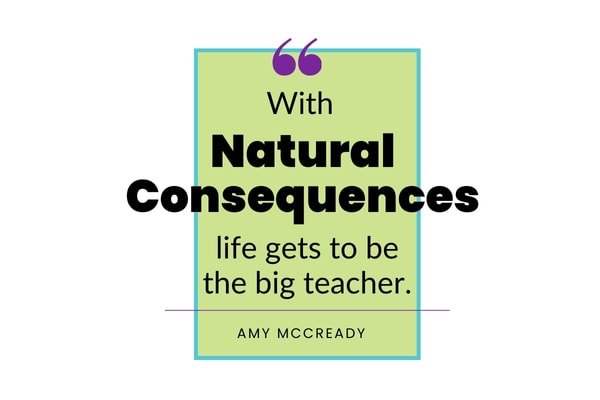Effective Consequences for Misbehavior: 5 Tips for Success
SLAM!
You cringe as the sound of your daughter’s door shakes the entire house. For the third time this week, she’s come home late from school without calling first, and tonight, you decided to confront her about it.
Of course, things didn’t end well…
After a long (and loud) argument, she’s now brooding in her room while you march over to the computer. You’re tired of the constant fighting, disrespect, and door slams. You’ve had enough and are ready to search for help.
So you hop online and type in the only question you can think of:
What’s the best punishment for my child’s disrespect and defiance?
Oh, dear friend, if you only knew how often that question comes up in my line of work! And I would love to give you a plain and simple, straightforward answer.
But I can’t.
Because you’re asking the wrong question.
Whether they’re taking my FREE ONLINE PARENTING CLASS or looking for private coaching support, I’ve noticed something in common among many of the parents first coming to me for help.
They want to know what punishments will work for their kids’ misbehavior. That’s when I challenge them to shift their mindset–because punishments don’t work.
But–when the proper groundwork has been laid–consequences can be!
First, Can This Be Solved Another Way?
Before we dive into these five tips for effective consequences, I want you first to ask yourself: Can this be solved another way?
Although consequences are necessary from time to time, there are always other parenting tools you can implement beforehand that are more effective.
For example, one of the most powerful tools we teach at Positive Parenting Solutions is what’s known as MIND, BODY AND SOUL TIME® connection. (MBST). This tool, though simple, packs a powerful punch and is one of the most surefire ways to cut down on power struggles and misbehavior.
All you have to do is commit 10-15 minutes each day to playing with your child (one-on-one). That’s right–playing!
Let them choose the activity, put away all distractions, and pour into them all the positive attention they so desperately crave. Behavior almost magically improves by meeting their need for positive attention and emotional connection.
Or, if your child is older and playing isn’t their thing, you can still spend time doing something together they enjoy. Perhaps you foster their love of art by signing up for classes at a local pottery studio or practice your photography skills together on a nature walk.
It’s not important what you do–just that you do something together.
Pro Tip: Did you know we have 37 easy-to-implement parenting tools offered in The 7-Step Parenting Success System? Consequences are one tool — but not your only option.
It’s also important to remember that your child’s good behavior is a collaborative effort. You have to work with them…taking time to train them in the positive behaviors you want to see and work with them on solutions when issues arise.
Your 3-year-old won’t know it’s wrong to color on the walls until you teach her not to and give her alternative outlets for her creative genius, just as your 16-year-old won’t know how to handle saying “no” to peer pressure unless you train him in advance how to get out of difficult situations.
The relationship you have with your child and the behavior you see in your child is a two-way street with plenty of give and take. Ensure they have the proper training and loving support they need first, and see what you get back.
Helpful Hint: Positive Parenting Solutions Members, be sure to check out the Collaborative Problem Solving approach by Dr. Ross Green. You’ll find it in The Explosive Child Expert Series masterclass in the 7-Step Parenting Success System.
Of course, these are just a few examples of the many tools that can and should be used before consequences. In fact, we offer 37 easy-to-implement parenting tools in The 7-Step Parenting Success System.
With so many practical resources readily available for parents, the times you’ll need to use consequences should be few and far between.
Now that we’ve covered a few options you can use before consequences, let’s move on to those helpful tips…
Tip #1: Avoid Punishment
If this first tip sounds impossible, I get it. It almost feels second nature for parents to jump to punishments when their kid acts out of line.
But, many parents misunderstand that punishments are NOT the same as consequences.
So what’s the difference?
Dr. Jane Nelsen–the mother of Positive Discipline–explained it best when she described punishment as anything that causes a child to feel blame, shame, or pain.
For instance, it may feel like your only option is to give your son a swift spank on the bottom after hitting his sister. But, in reality, it does little to change his future behavior. He may stop in the moment, but you can bet he will hit her again–especially if he struggles with impulse control.
It also doesn’t make much sense, especially for young kids.
They think, If Mom and Dad don’t want me to hit, then why are they hitting me?
Punishments that cause your child to be embarrassed or humiliated–like yelling at them in front of their friends–aren’t helpful, either. In fact, they’re more likely to drive a wedge in your relationship and lead your child to lie in the future rather than make a genuine behavior shift.
Punishments rely on using negative feelings to end a negative behavior, which simply doesn’t work. However, consequences used correctly will empower your child to make the right choices the next time around.
Tip #2: Always Give a Warning in Advance
Your kids have some exceptional abilities, but mind-reading isn’t one of them.
Your toddler knows to stay away from the hot stove because you told him it’s hot.
Your older child knows to look both ways before crossing the street because you’ve spent years training her to do so safely.
As parents, it’s no secret our kids are impulsive and typically act long before they think (especially when they’re little). But it’s also our job to make sure they’re fully aware and prepared for the less-than-desirable outcomes of their actions.
When it comes to figuring out effective consequences for your child, unless you give them a little grace and advanced warning (before they mess up), the consequences will be entirely ineffective because they’ll feel like punishment.
Kids need to know the possible consequences of their actions before they have the opportunity to make a mistake, so they have every chance to make a positive decision.
So what does this sound like, exactly?
**Friendly note: Mistakes happen, and kids deserve grace. We should only issue these warnings to our kids based on repeated patterns.
I’m glad you asked! Here are a couple of examples:
Samantha, you are growing up in so many ways, and you are mature enough now to remember to take what you need for gym class. So, I will no longer be driving your forgotten sneakers or gym clothes to school in the future. If you forget your sneakers on gym days, you’ll have to miss out on enjoying gym time with the rest of the class. What systems or reminders would you like to put in place to help you remember on your own?
Marcus, I noticed you used your iPad during our family’s tech-free hours. If you choose to sneak more tech time, you will lose your iPad privileges for the next three days. Is there anything you want to do to help you remember our tech rules? Or is there a system you want to put in place so you know how much time you have left?
Then, have them repeat the expectation and the possible consequence back to you so they’re crystal clear on what will happen. When your kids know the consequences before you have to use them, the ball is now in their court. They are responsible for what happens next–not you!
Not only is this incredibly freeing to you–the parent–but it also hands over a certain amount of power and control to your child (which they love!).
And don’t forget to make sure they are set up for success — with systems or reminders that they create — and let them know you have confidence they’ll be able to make the right decision independently.
You won’t believe how empowering that can be!
Tip #3: Seek Natural Consequences First
If you want the cream of the crop of consequences, Natural Consequences are the way to go. So seek those first!
Natural Consequences occur without any parental involvement, as opposed to Logical Consequences, where you have a stake in the game.
Let’s say your 6th grader left his math homework on his desk at home. He knew the assignment was due the following day but forgot to put it in his backpack before heading out the door.
He’d already been warned in advance (as described in Step 2 of the course) that it was his responsibility to make sure his assignments made it to school with him. You’ve had this conversation many times before. He knows the consequences.
So, when he ultimately realizes that he left his homework on his desk–and understands it’s his job to remember it–he’ll know the consequence falls squarely on his shoulders. He’ll have to take the dock in the grade that comes with a late assignment.
No parent wants to be the bad guy. With Natural Consequences, life gets to be the big teacher!
And in the future, he’ll likely be much more adamant about remembering his jersey. No reminding from you required!
How amazing is that?!
And once the natural consequence has played out, you can step in and offer your assistance. Calmly (and without an I-told-you-so attitude), ask how he can tweak his routine to ensure the same problem doesn’t happen again.
Helpful Hint: Make sure the consequence is reasonable in its severity or duration.
For example, your daughter insists on walking to the bus stop in shorts in February. That’s an excellent opportunity for a natural consequence! But a 3-hour winter Girl Scout hike? Nope-the consequences are too dangerous.
Instead, you might simply tell her you’ll give her a ride when she’s dressed appropriately-and alert her to the fact that if she’s late, she may miss the hike altogether.
The same goes for a consequence that might seriously inconvenience another person. In cases like these, consequences may not be the right tool — you’ll want to use another of the 36 tools in our Toolbox.
Unfortunately, it’s not always feasible to find a Natural Consequence for every misbehavior. That’s when you’ll move on to a Logical one.
Tip #4: Choose Consequences that Fit the Misbehavior
While Natural Consequences are more effective than Logical Consequences because they let life be the teacher, sometimes they’re simply not an option. That’s when we, as parents, must take on the unpleasant task of engineering the consequences ourselves.
However, Logical Consequences can be tricky because they have to be just that–logical! Which isn’t always the easiest to figure out, especially in the pinch of the moment.
Still, I cannot stress this enough: Logical Consequences must be related to your child’s misbehavior.
If there’s no relation, I promise you, they’ll be useless in the long run. They’ll only make your child angry at you and won’t prompt them to learn from their mistakes.
Of course, determining a Logical Consequence is much easier said than done. . .
That’s because we all get hung up on our child’s “currency.” You know, that thing they love so much that it’s our go-to item to take away for any and all misbehavior (whether it’s related or not).
You might have taken away your son’s video game privileges because he refused to mow the lawn or canceled your daughter’s playdates because she slapped her little sister.
More often than not, we use whatever has the most leverage to gain control over our child.
While this may appear to work in the short term–like your son giving in and mowing the lawn–you’re guaranteeing an increase in power struggles down the line.
They may even decide that their “currency” isn’t all that valuable after all and would rather be stubborn and fight back.
Simply put, when the consequence isn’t directly related to the actual behavior choice, nothing is learned.
So what does an effective Logical Consequence look like?
I’m glad you asked…
Let’s say your 12-year-old received a brand-new drum set for Christmas. For years she’s been begging to learn to play, and you finally feel like she’s old enough to be responsible with them.
The gift comes with only one stipulation–no playing between 8 PM and 8 AM.
You warn her in advance that the consequence of breaking this rule will mean losing her drum privileges for three days. The consequence is reasonable and related, and you have her repeat it back to you so she’s clear. You also brainstorm with her ways of reminding herself to be done by 8:00, and she decides to set a recurring alarm on her watch.
She should be able to manage that, right?
Wrong.
After about a week of putting away her drumsticks by 8 PM, she pushes the limit and shows no signs of stopping, even at 8:15. It’s time to follow through with the consequence you set up. And as much as you’d like to let life be the big teacher here, you know that job is all yours.
In a calm voice, you enter the room and say, “I see you chose to lose your drum-playing privileges by ignoring the playing hours you agreed to. You’ll need to put your drumsticks away until Thursday. But this is a learning opportunity, and I have confidence you’ll be able to follow the rules for quiet time in the future.”
Naturally, she protests. But in the end, she knows it was her actions alone that led to the unwanted consequence–and you can bet she’ll keep a better eye on the time starting Thursday.
As with Natural Consequences, you’ll want to make sure Logical Consequences are reasonable in severity and duration. You’ll be more likely to follow through when they are something you can live with.
Tip #5: Make it a Teachable Moment
As parents, we love teachable moments, don’t we?
There’s nothing quite like seeing an important lesson finally sink into our kids’ brains. It’s just so satisfying!
But we must remember that we shouldn’t use consequences so haphazardly that our child learns nothing from the experience.
Because our ultimate goal isn’t to end misbehavior…
Uh, say what now, Amy?
Our ultimate goal is to find and use strategies that will be most helpful to our child while continuing to foster a strong parent-child connection.
Do we want our kids to behave better? Absolutely!
But it’s far more important to ensure that every consequence creates a ripple effect in their lives. It’s to make sure the lessons learned are important enough to stick around for future reference.
When you’re processing what happened with your child, just be sure to avoid the “I told you so.”
“I know it will be hard for you without your screen time privileges, and you’re frustrated. But you can learn from this! I have confidence you’ll be able to follow the rules next time.”
As I said before, consequences should be used sparingly. There are often other, more effective strategies to try first.
And should you find your head reeling, wondering just how you’ll lay off the consequences? Don’t worry because teachable moments aren’t just for our kids.
Sometimes, we’re the ones who need to learn the lesson.
Final Thoughts
At some point, every parent has struggled with understanding how to hand out consequences appropriately. And should you find yourself deep in the consequence trenches, know there is no better time to get a handle on things than right now.
These five tips are a fantastic starting point to get you heading in the right direction but know that there are many more resources to help you end your child’s misbehavior.
With both practice and intention, I promise you’ll be a consequence master in no time!
What You Should Do Next:
1. Get Quick Actionable TIPS delivered to your inbox
Sign up for my newsletter for parenting tips to help you create a happier home and become the parent you always wanted to be. Plus, when you subscribe, I'll also send you a copy of our strategy-packed guide 10 Tips for Better Behavior – Starting NOW!
2. Unlock the secrets to easier parenting in my FREE CLASS
Register for my free class called How to Get Kids to Listen, Without Nagging, Yelling or Losing Control. Classes run several times per week to accommodate your busy schedule.
3. Transform your family with the 7-Step Parenting Success System® Course
Join the hundreds of thousands of parents who have transformed their families with the 7-Step Parenting Success System® Course. Learn the tools you need to raise happy, respectful, responsible kids and create the family life you always dreamed of having.
About the Author









